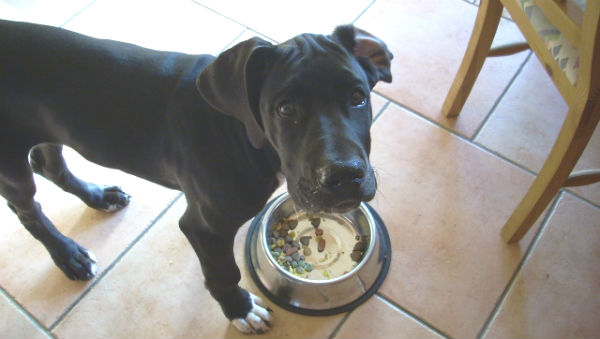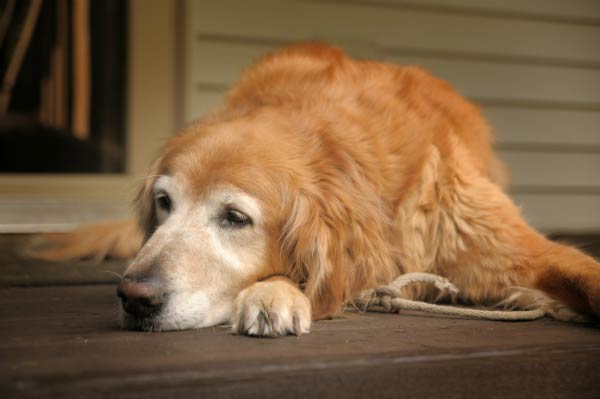What is the Best Food to Feed a Large Breed Canine
AKC is a participant in affiliate advertising programs designed to provide a means for sites to earn advertising fees by advertising and linking to akc.org. If you purchase a product through this article, we may receive a portion of the sale.
Owning a large breed dog comes with large responsibilities, especially when it comes to choosing the best large breed dog food. After all, you want your dog to live a long, healthy, active life, and that starts with good nutrition. Feeding a properly formulated, high-quality diet is one of the most important things you can do to keep your dog healthy and prevent disease, according to the experts, which puts a lot of pressure on owners to find the best dog food for large breeds.
There are countless choices on the shelves, all claiming to be the best. Before you start shopping, there are a few things you need to know about large dog nutrition to help you choose the best food for your dog from puppyhood to his golden years.
Large Dog Nutrition 101
Dogs require a wide range of nutrients, including vitamins and minerals, which is why feeding a complete and balanced commercial diet is the most reliable and convenient choice for most owners. Commercial dog foods include meats, grains, vegetables, and fruits to meet the nutritional standards of dog food regulations. A high-quality dog food combines sources of protein, fiber, carbohydrates, vitamins, and minerals in a manner that is easily digested by dogs to make sure your dog gets what she needs every day.
For the most part, large dog nutrition is similar to small and medium dog nutrition, with a few important exceptions. Large breed puppies require special diets to avoid certain health risks, and large breed adult dogs require careful monitoring for signs of orthopedic disease, obesity, and bloat. All of these diseases are heavily influenced by nutrition.
Talk to your vet if you are considering exploring a home-cooked diet or alternative feeding regimen for your dog. Your vet can help you balance your dog's nutritional needs, while answering any further questions you may have about dog nutrition.
Best Large Breed Puppy Food

Large breed puppies require special attention when it comes to mealtime. Large and giant breed puppies grow quickly and keep growing longer than smaller dogs. A dog born weighing one pound can grow to 150 pounds within the first 18 months of its life. This accelerated growth rate means that large breed puppies are very sensitive to nutrient and caloric intake – imbalances, deficiencies, and excesses all negatively impact your large breed puppy's health.
Growing too quickly is not healthy for large breed puppies. Excessive growth has been linked to developmental orthopedic disease (DOD), which covers a range of conditions including:
- Hypertrophic osteodystrophy
- Osteochondrosis
- Retained ulnar cartilage core
- Panosteitis
- Hip dysplasia
- Elbow dysplasia
Overnutrition plays a large role in excessive growth, which is why it is important to feed them a large breed puppy food formulated specifically for their nutritional needs. These diets differ from regular puppy diets in four ways:
- Lower in fat
- Lower in calcium
- Lower in phosphorus
- Lower in vitamin D
While it is tempting to think that large breed puppies need more calcium to support healthy bone growth, studies have linked high levels of calcium and phosphorus to DOD. Limiting the intake of calcium, phosphorus, and vitamin D helps reduce the risk of DOD in puppies, and limiting the number of calories in their food helps to slow growth rates.
How much you feed your puppy also matters. Veterinarians discourage free feeding of large breed puppies, as this too has been linked to DOD. Instead, feed your puppy several smaller meals throughout the day and monitor his weight to make sure it stays within a healthy range. Ask your veterinarian for help determining the appropriate weight range for your dog's breed.
Best Large Breed Dog Food for Adults
Once your large breed puppy has reached adulthood, it is time to find yet another food. This transitional period is a good opportunity to talk to your vet about her recommendations for the best large breed dog food. Your veterinarian will be happy to share insights and observations about the best diet for your dog based on breed, size, and other health concerns, and vets have access to a wide range of resources that allow them to help you make an informed choice.
There are three conditions that are influenced by your dog's nutrition that affect large breed adult dogs:
- Orthopedic disease
- Obesity
- Bloat
Orthopedic Disease in Dogs
Large and giant breed dogs are more prone to developing musculoskeletal and orthopedic disorders like hip dysplasia, arthritis, and osteochondrosis. These diseases are linked to excessive growth, hereditary factors, exercise, and nutrition. As an owner, there is not much you can do about hereditary factors, aside from selecting a puppy from a responsible breeder and only breeding healthy dogs, but you do have control over growth rate, exercise, and nutrition.
Feeding your puppy an appropriate large breed puppy diet decreases the dog's risk of developing DOD. Once he is an adult, it is up to you to monitor diet and exercise to make sure he maintains a healthy weight. A good quality diet with the proper balance of nutrients for large breed dogs helps prevent joints, muscles, and bones from breaking down. Many large breed adult formulas include the joint supplement glucosamine to further improve orthopedic health.
Obesity in Dogs
An estimated 53 percent of American dogs are obese or overweight. Obesity is particularly dangerous for large breed dogs, as it increases their risk of developing orthopedic diseases later in life. All of that extra weight stresses their joints, muscles, and bones, which can lead to serious conditions that affect their quality of life and mobility. Obesity has also been linked to other serious health conditions, including Type 2 diabetes, kidney disease, and high-blood pressure.
Bloat in Dogs
Bloat, known in the veterinary community as gastric dilation and volvulus (GDV), is a very serious and sometimes fatal condition that affects large and giant breed dogs. Bloat occurs when gasses accumulate in the stomach rapidly and have no way to escape. Bloat can be fatal in just a few hours. While there are several different treatment options, prevention is still the best approach for dealing with bloat. Here are a few steps you can take to reduce your dog's risk of bloat.
- Feed multiple meals a day, instead of one large, heavy meal, to prevent rapid eating
- Feed from floor level (not a raised feeder)
- Avoid foods with high-fat contents (foods with oil and fat in the first four ingredients on the label)
- Feed foods with large kibble
- Avoid strenuous exercise 1-2 hours after eating
The best option to help your large breed dog avoid this condition is usually a large breed dog formula. Look for a reputable dog food manufacturer that carries a large breed formula and don't hesitate to ask your veterinarian for her recommendations.
Best Large Breed Dog Food for Seniors

Dog food designed for senior dogs is relatively new. There is no "senior stage" approved by the Association of American Feed Control Officials (AAFCO) or the U.S. Food and Drug Administration (FDA) as of yet, which means that the senior dog foods marketed in pet stores have not undergone the same rigorous tests as food for the other life stages. That does not mean, however, that they are not a good option for your senior dog. Adult formulas, all life-stage formulas, and senior formulas can all be appropriate foods for senior dogs.
Senior dogs often develop other health problems that require veterinary attention and maintenance. Sometimes a prescription diet is the best dog food option for large breed seniors, as these veterinary-approved foods are specifically formulated to address your dog's needs. Talk to your vet about the best food for large breed senior dogs.
The Truth About Dog Food Labels
Dog food labels are a valuable source of information about your dog's food. They can also be misleading. As you search for the best food for large breeds, you will encounter a huge selection of products. As you do your research, here are a few things to keep in mind:
- Look for a dog food labeled "complete and balanced"
- Select a dog food that has been clinically tried and tested
- Ignore unregulated phrases such as "all natural" and "human-grade ingredients"
- Avoid foods with oils and fats listed in the first four ingredients
Dog food labels won't tell you very much about the quality of the ingredients. In fact, no reference to quality is technically allowed. What the ingredient list does tell you is where the proteins and carbohydrates in the food come from. This is very useful for dogs with food allergies or sensitivities and for owners looking for a specific source of protein for their dogs.
How Much to Feed a Large Breed Dog
There is no easy answer to the question: how much to feed a large breed dog? Every dog's caloric needs are unique. The nutrition label on your dog's food provides guidelines for owners, but you may need to tailor them to your dog.
A good way to figure out how much food to feed your dog is to talk to your veterinarian about your dog's weight. Veterinarians judge the weight of a dog based on something called the "body condition score." This helps them determine if your dog is at an ideal weight or if he is overweight or underweight, and how you should adjust his food.
The Price of Large Breed Dog Food
Large breed dogs consume large amounts of food, which means that it costs more to feed a large breed dog than it does to feed a small breed dog. This is an important consideration for anyone thinking about purchasing a large breed puppy.
It is tempting to purchase a cheaper food for large breed dogs to save money. While there are plenty of good quality dog foods in various price ranges, always be sure to investigate the quality of your dog's food. When you invest in dog food, you invest in your pet's health. In the case of cheap, poor quality food, that can mean getting exactly what you pay for.
So What Is the Best Food for Large Breeds?
There is no one brand of food that is the best food for large breeds. As an owner, it is up to you to do your research about large breed nutrition and determine which food is the best for your dog. The best way to do this is to consult with your veterinarian. Your vet can help you come up with a lifelong nutrition plan for all your dog's stages of life, giving him the best chance at a long and healthy life.
hardcastlecoubjecruir.blogspot.com
Source: https://www.akc.org/expert-advice/nutrition/best-large-breed-dog-food/
Post a Comment for "What is the Best Food to Feed a Large Breed Canine"